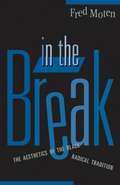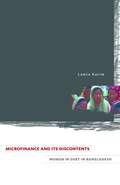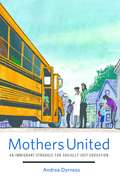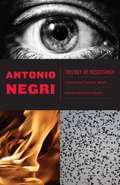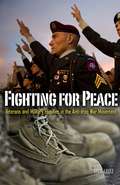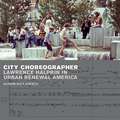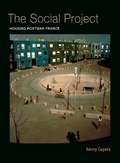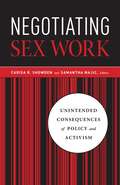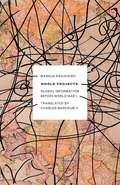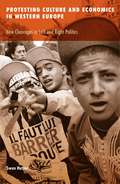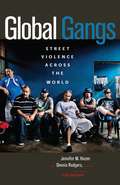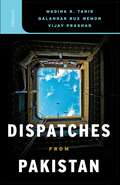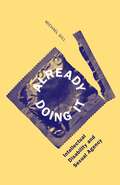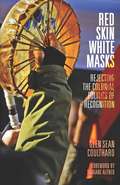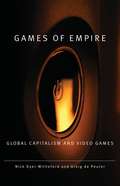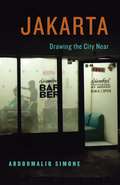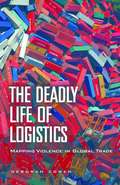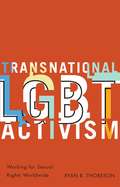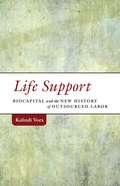- Table View
- List View
In the Break: The Aesthetics Of The Black Radical Tradition
by Fred MotenIn his controversial essay on white jazz musician Burton Greene, Amiri Baraka asserted that jazz was exclusively an African American art form and explicitly fused the idea of a black aesthetic with radical political traditions of the African diaspora. In the Break is an extended riff on OC The Burton Greene Affair, OCO exploring the tangled relationship between black avant-garde in music and literature in the 1950s and 1960s, the emergence of a distinct form of black cultural nationalism, and the complex engagement with and disavowal of homoeroticism that bridges the two. Fred Moten focuses in particular on the brilliant improvisatory jazz of John Coltrane, Ornette Coleman, Albert Ayler, Eric Dolphy, Charles Mingus, and others, arguing that all black performanceOCoculture, politics, sexuality, identity, and blackness itselfOCois improvisation. For Moten, improvisation provides a unique epistemological standpoint from which to investigate the provocative connections between black aesthetics and Western philosophy. He engages in a strenuous critical analysis of Western philosophy (Heidegger, Kant, Husserl, Wittgenstein, and Derrida) through the prism of radical black thought and culture. As the critical, lyrical, and disruptive performance of the human, MotenOCOs concept of blackness also brings such figures as Frederick Douglass and Karl Marx, Cecil Taylor and Samuel R. Delany, Billie Holiday and William Shakespeare into conversation with each other. Stylistically brilliant and challenging, much like the music he writes about, MotenOCOs wide-ranging discussion embraces a variety of disciplinesOCosemiotics, deconstruction, genre theory, social history, and psychoanalysisOCoto understand the politicized sexuality, particularly homoeroticism, underpinning black radicalism. In the Break is the inaugural volume in MotenOCOs ambitious intellectual project-to establish an aesthetic genealogy of the black radical tradition. "
Politics the Wellstone Way
by Wellstone Action Wellstone Action Wellstone Action Bill LofyDuring the past four years, political activism has grown to a level that has not been seen in the United States since the Vietnam War. Tensions over the war in Iraq and the presidential election motivated hundreds of thousands of people on both sides of the political fence to take to the streets. Politics the Wellstone Way offers a comprehensive set of strategies to help progressives channel that energy into winning issue-based and electoral campaigns.Wellstone Action is a nonprofit organization dedicated to continuing Paul and Sheila Wellstone's fight for progressive change and economic justice by teaching effective political action skills to people across the country. Politics the Wellstone Way is a workshop in book form, providing the detailed framework needed to jump-start a new generation of activists plus plenty of helpful tools for old pros, including articulating a strong message, base building, field organizing, budgeting, fundraising, scheduling, getting out the vote, and grassroots advocacy and lobbying, illustrated by practical and inspirational examples.From the school board all the way to the White House, Politics the Wellstone Way instructs people on becoming better organizers, candidates, campaign workers, and citizen activists, empowering them to make their voices heard.Wellstone Action was established by the Wellstones' two surviving sons, David and Mark. The main vehicle for this ongoing work is Camp Wellstone, a weekend training program that Wellstone Action leads regularly in locations across the country. Jeff Blodgett, Paul Wellstone's longtime campaign manager, is the executive director of Wellstone Action. For more information visit www.wellstoneaction.com.
Brand Aid
by Stefano Ponte Lisa Ann Richey"Has there ever been a better reason to shop?" asks an ad for the Product RED American Express card, telling members who use the card that buying "cappuccinos or cashmere" will help to fight AIDS in Africa. Cofounded in 2006 by the rock star Bono, Product RED has been a particularly successful example of a new trend in celebrity-driven international aid and development, one explicitly linked to commerce, not philanthropy. In Brand Aid, Lisa Ann Richey and Stefano Ponte offer a deeply informed and stinging critique of "compassionate consumption." Campaigns like Product RED and its precursors, such as Lance Armstrong's Livestrong and the pink-ribbon project in support of breast cancer research, advance the expansion of consumption far more than they meet the needs of the people they ostensibly serve. At the same time, such campaigns sell both the suffering of Africans with AIDS (in the case of Product RED) and the power of the average consumer to ameliorate it through familiar and highly effective media representations. Using Product RED as its focal point, this book explores how corporations like American Express, Armani, Gap, and Hallmark promote compassionate consumption to improve their ethical profile and value without significantly altering their business model, protecting themselves from the threat to their bottom lines posed by a genuinely engaged consumer activism. Coupled with the phenomenon of celebrity activism and expertise as embodied by Bono, Richey and Ponte argue that this "causumerism" represents a deeply troubling shift in relief efforts, effectively delinking the relationship between capitalist production and global poverty.
Winning Your Election the Wellstone Way
by Bill Lofy Erik Peterson Jeff Blodgett Ben GoldfarbAs the 2008 presidential race dominates political discussion and media coverage worldwide, thousands of lesser-known local contests are being hard-fought in our neighborhoods, cities, and states. Winning Your Election the Wellstone Way is based on the work of Wellstone Action, a leading-edge progressive training center that has instructed thousands of political activists, campaign managers, and volunteers, of whom more than two hundred have gone on to run for office and win. Jeff Blodgett and Bill Lofy analyze the crucial lessons learned from many successful (and several losing) campaigns and demystifies what it takes to run for--and win--a political seat.This companion guide to Politics the Wellstone Way, the best-selling introduction to political action, features the in-depth knowledge that campaigns need to take energy and engagement to the next level--getting elected. With detailed and informative examples from progressive campaigns at every level throughout the United States, Winning Your Election the Wellstone Way combines grassroots organizing with political strategy, articulating a bold populist agenda.If you have ever considered volunteering for a political candidate, working for a campaign, or even running for public office yourself, Winning Your Election the Wellstone Way is the key resource you need to devise a sophisticated, progressive, and successful strategy and, ultimately, affect people's lives for the better.
Microfinance and its Discontents
by Lamia KarimIn 2006 the Grameen Bank of Bangladesh won the Nobel Peace Prize for its innovative microfinancing operations. This path-breaking study of gender, grassroots globalization, and neoliberalism in Bangladesh looks critically at the Grameen Bank and three of the leading NGOs in the country. Amid euphoria over the benefits of microfinance, Lamia Karim offers a timely and sobering perspective on the practical, and possibly detrimental, realities for poor women inducted into microfinance operations. In a series of ethnographic cases, Karim shows how NGOs use social codes of honor and shame to shape the conduct of women and to further an agenda of capitalist expansion. These unwritten policies subordinate poor women to multiple levels of debt that often lead to increased violence at the household and community levels, thereby weakening women's ability to resist the onslaught of market forces. A compelling critique of the relationship between powerful NGOs and the financially strapped women beholden to them for capital, this book cautions us to be vigilant about the social realities within which women and loans circulate--realities that often have adverse effects on the lives of the very women these operations are meant to help.
Mothers United
by Andrea DyrnessIn urban American school systems, the children of recent immigrants and low-income parents of color disproportionately suffer from overcrowded classrooms, lack of access to educational resources, and underqualified teachers. The challenges posed by these problems demand creative solutions that must often begin with parental intervention. But how can parents without college educations, American citizenship, English literacy skills, or economic stability organize to initiate change on behalf of their children and their community? In Mothers United, Andrea Dyrness chronicles the experiences of five Latina immigrant mothers in Oakland, California--one of the most troubled urban school districts in the country--as they become informed and engaged advocates for their children's education. These women, who called themselves "Madres Unidas" ("Mothers United"), joined a neighborhood group of teachers and parents to plan a new, small, and autonomous neighborhood-based school to replace the overcrowded Whitman School. Collaborating with the author, among others, to conduct interviews and focus groups with teachers, parents, and students, these mothers moved from isolation and marginality to take on unfamiliar roles as researchers and community activists while facing resistance from within the local school district. Mothers United illuminates the mothers' journey to create their own space--centered around the kitchen table--that enhanced their capacity to improve their children's lives. At the same time, Dyrness critiques how community organizers, teachers, and educational policy makers, despite their democratic rhetoric, repeatedly asserted their right as "experts," reproducing the injustice they hoped to overcome. A powerful, inspiring story about self-learning, consciousness-raising, and empowerment, Mothers United offers important lessons for school reform movements everywhere.
Trilogy of Resistance
by Antonio Negri Timothy S. MurphyWith Trilogy of Resistance, the political philosopher Antonio Negri extends his intervention in contemporary politics and culture into a new medium: drama. The three plays collected for the first time in this volume dramatize the central concepts of the innovative and influential thought he has articulated in his best-selling books Empire and Multitude, coauthored with Michael Hardt. In the tradition of Bertolt Brecht and Heiner Müller, Negri's political dramas are designed to provoke debate around the fundamental questions they raise about resistance, violence, and tyranny. In Swarm, the protagonist searches for an effective mode of activism; with the help of a Greek-style chorus, she tries on different roles, from the suicide bomber and party apparatchik to the multitude. The Bent Man, set in fascist Italy, focuses on a woodcutter who resists fascism by bending himself in two and using his own now-twisted body as a weapon against war. In Cithaeron, perhaps the most audacious of the three plays, Negri reworks Euripides's Bacchae to explore the circumstances that would compel a diverse and creative community to withdraw from both the despotic government that constrains it and the traditional family relationships that reinforce that despotism.First published in France in 2009 and featuring an introduction by Negri, Trilogy of Resistance provides a direct and passionate distillation of Negri's concepts and offers insights into one of the most important projects in political philosophy currently under way, as well as a timely reminder of the power of theater to effectively dramatize complex and challenging ideas.
The Reorder of Things: The University and its Pedagogies of Minority Difference
by Roderick A. FergusonIn the 1960s and 1970s, minority and women students at colleges and universities across the United States organized protest movements to end racial and gender inequality on campus. African American, Chicano, Asia American, American Indian, women, and queer activists demanded the creation of departments that reflected their histories and experiences, resulting in the formation of interdisciplinary studies programs that hoped to transform both the university and the wider society beyond the campus. In The Reorder of Things, however, Roderick A. Ferguson traces and assesses the ways in which the rise of interdisciplines--departments of race, gender, and ethnicity; fields such as queer studies--were not simply a challenge to contemporary power as manifest in academia, the state, and global capitalism but were, rather, constitutive of it. Ferguson delineates precisely how minority culture and difference as affirmed by legacies of the student movements were appropriated and institutionalized by established networks of power. Critically examining liberationist social movements and the cultural products that have been informed by them, including works by Adrian Piper, Toni Cade Bambara, Jhumpa Lahiri, and Zadie Smith, The Reorder of Things argues for the need to recognize the vulnerabilities of cultural studies to co-option by state power and to develop modes of debate and analysis that may be in the institution but are, unequivocally, not of it.
Fighting for Peace
by Lisa LeitzFighting for Peace brings to light an important yet neglected aspect of opposition to the Iraq War--the role of veterans and their families. Drawing on extensive participant observation and interviews, Lisa Leitz demonstrates how the harrowing war experiences of veterans and their families motivated a significant number of them to engage in peace activism. Married to a Navy pilot herself, Leitz documents how military peace activists created a movement that allowed them to merge two seemingly contradictory sides of their lives: an intimate relation to the military and antiwar activism. Members of the movement strategically deployed their combined military-peace activist identities to attract media attention, assert their authority about the military and war, and challenge dominant pro-war sentiment. By emphasizing the human costs of war, activists hoped to mobilize American citizens and leaders who were detached from the wars in Iraq and Afghanistan, bring the wars to an end, and build up programs to take care of returning veterans and their families. The stories in Fighting for Peace ultimately reveal that America's all-volunteer force is contributing to a civilian-military divide that leaves civilians with little connection to the sacrifices of the military. Increasingly, Leitz shows, veterans and their families are being left to not only fight America's wars but also to fight against them.
City Choreographer
by Alison Bick HirschOne of the most prolific and influential landscape architects of the twentieth century, Lawrence Halprin (1916-2009) was best known for the FDR Memorial in Washington, D.C., and Sea Ranch, the iconic planned community in California. These projects, as well as vibrant public spaces throughout the country--from Ghirardelli Square and Market Street in San Francisco to Lovejoy Fountain Park in Portland and Nicollet Mall in Minneapolis--grew out of a participatory design process that was central to Halprin's work and is proving ever more relevant to urban design today. In City Choreographer, urban designer and historian Alison Bick Hirsch explains and interprets this creative process, called the RSVP Cycles, referring to the four components: resources, score, valuation, and performance. With access to a vast archive of drawings and documents, Hirsch provides the first close-up look at how Halprin changed our ideas about urban landscapes. As an urban pioneer, he found his frontier in the nation's densely settled metropolitan areas during the 1960s. Blurring the line between observer and participant, he sought a way to bring openness to the rigidly controlled worlds of architectural modernism and urban renewal. With his wife, Anna, a renowned avant-garde dancer and choreographer, Halprin organized workshops involving artists, dancers, and interested citizens that produced "scores," which then informed his designs. City Choreographer situates Halprin within the larger social, artistic, and environmental ferment of the 1960s and 1970s. In doing so, it demonstrates his profound impact on the shape of landscape architecture and his work's widening reach into urban and regional development and contemporary concerns of sustainability.
The Social Project
by Kenny CupersIn the three decades following World War II, the French government engaged in one of the twentieth century's greatest social and architectural experiments: transforming a mostly rural country into a modernized urban nation. Through the state-sanctioned construction of mass housing and development of towns on the outskirts of existing cities, a new world materialized where sixty years ago little more than cabbage and cottages existed.Known as the banlieue, the suburban landscapes that make up much of contemporary France are near-opposites of the historic cities they surround. Although these postwar environments of towers, slabs, and megastructures are often seen as a single utopian blueprint gone awry, Kenny Cupers demonstrates that their construction was instead driven by the intense aspirations and anxieties of a broad range of people. Narrating the complex interactions between architects, planners, policy makers, inhabitants, and social scientists, he shows how postwar dwelling was caught between the purview of the welfare state and the rise of mass consumerism.The Social Project unearths three decades of architectural and social experiments centered on the dwelling environment as it became an object of modernization, an everyday site of citizen participation, and a domain of social scientific expertise. Beyond state intervention, it was this new regime of knowledge production that made postwar modernism mainstream. The first comprehensive history of these wide-ranging urban projects, this book reveals how housing in postwar France shaped both contemporary urbanity and modern architecture.
Negotiating Sex Work
by Samantha Majic Carisa R. ShowdenGlobally, discussions about sex work focus on exploitation. The media regularly provides us with stories about teen girls coerced to perform sexual acts for money, frequently beaten and robbed by their pimps or traffickers. While one would have to be hard-pressed to deny that sex workers are victimized, the popular media and our political leaders emphasize sex work as exclusively exploitative. In Negotiating Sex Work, Carisa R. Showden and Samantha Majic present a series of essays that depict sex work as an issue far more complex than generally perceived.Positions on sex work are primarily divided between those who consider that selling sexual acts is legitimate work and those who consider it a form of exploitation. Organized into three parts, Negotiating Sex Work rejects this either/or framework and offers instead diverse and compelling contributions that aim to reframe these viewpoints. Part I addresses how knowledge about sex work and sex workers is generated. The next section explores how nations and political actors who claim to protect individuals in sex work often further marginalize them. Finally, part III examines sex workers' own political-organizational efforts to combat laws and policies that deem them deviant, sinful, or total victims.A timely and necessary intervention into sex work debates, this volume challenges how policy makers and the broader public regard sex workers' capacity to advocate for their own interests.Contributors: Cheryl Auger; Sarah Beer, Dawson College, Montreal; Michele Tracy Berger, U of North Carolina-Chapel Hill; Thaddeus Gregory Blanchette, Federal U of Rio de Janeiro; Raven Bowen; Gregg Bucken-Knapp, U of Gothenburg, Sweden; Ana Paula da Silva, Federal U of Viçosa; Valerie Feldman; Gregor Gall, U of Bradford; Kathleen Guidroz, Georgetown U; Annie Hill, U of Minnesota; Johan Karlsson Schaffer, U of Oslo; Edith Kinney, Mills College; Yasmin Lalani; Pia Levin; Alexandra Lutnick; Tamara O'Doherty, U of the Fraser Valley, British Columbia; Joyce Outshoorn, U of Leiden; Francine Tremblay, Concordia U, Montreal.
World Projects
by Charles Marcrum II Markus KrajewskiMarkus Krajewski is emerging as a leading scholar in the field of media archaeology, which seeks to trace cultural history through the media networks that enable and structure it. In World Projects he opens a new portal into the history of globalization by examining several large-scale projects that, at the beginning of the twentieth century, shared a grand yet unachievable goal: bringing order to the world. Drawing from a broad array of archival materials, Krajewski reveals how expanding commercial relations, growing international scientific agreements, and an imperial monopolization of the political realm spawned ambitious global projects. World Projects contends that the late nineteenth-century networks of cables, routes, and shipping lines--of junctions, crossovers, and transfers--merged into a "multimedia system" that was a prerequisite for conceiving a world project. As examples, he presents the work of three big-thinking "plansmiths," each of whose work mediates between two discursive fields: the chemist and natural philosopher Wilhelm Ostwald, who spent years promoting a "world auxiliary language" and a world currency; the self-taught "engineer" and self-anointed authority on science and technology Franz Maria Feldhaus, who labored to produce an all-encompassing "world history of technology"; and Walther Rathenau, who put economics to the service of politics and quickly transformed the German economy. With a keen eye for the outlandish as well as the outsized, Krajewski shows how media, technological structures, and naked human ambition paved the way for global-scale ventures that together created the first "world wide web."
Protesting Culture and Economics in Western Europe
by Swen HutterIn this far-reaching work, Swen Hutter demonstrates the usefulness of studying both electoral politics and protest politics to better understand the impacts of globalization. Hutter integrates research on cleavage politics and populist parties in Western Europe with research on social movements. He shows how major new cleavages restructured protest politics over a thirty-year period, from the 1970s through the 1990s. This major study brings back the concept of cleavages to social movement studies and connects the field with contemporary research on populism, electoral behavior, and party politics.Hutter's work extends the landmark 1995 New Social Movements in Western Europe, the book that spurred the recognition that a broad empirical frame is valuable for understanding powerful social movements. This new book shows that it is also beneficial to include the study of political parties and protest politics. While making extensive use of public opinion, protest event, and election campaigning data, Hutter skillfully employs contemporary data from six West European societies--Austria, Britain, France, Germany, the Netherlands, and Switzerland--to account for responses to protest events and political issues across countries.Protesting Culture and Economics in Western Europe makes productive empirical, methodological, and theoretical contributions to the study of social movements and comparative politics. Empirically, it employs a new approach, along with new data, to explain changes in European politics over several decades. Methodologically, it makes rigorous yet creative use of diverse datasets in innovative ways, particularly across national borders. And theoretically, it makes a strong claim for considering the distinctive politics of protest across various issue domains as it investigates the asymmetrical politics of protest from left and right.
Global Gangs
by Dennis Rodgers Jennifer M. HazenGangs, often associated with brutality and senseless destructive violence, have not always been viewed as inherently antagonistic. The first studies of gangs depicted them as alternative sources of order in urban slums where the state's authority was lacking, and they have subsequently been shown to be important elements in some youth life cycles. Despite their proliferation there is little consensus regarding what constitutes a gang. Used to denote phenomena ranging from organized crime syndicates to groups of youths who gather spontaneously on street corners, even the term "gang" is ambiguous. Global Gangs offers a greater understanding of gangs through essays that investigate gangs spanning across nations, from Brazil to Indonesia, China to Kenya, and from El Salvador to Russia. Volume editors Jennifer M. Hazen and Dennis Rodgers bring together contributors who examine gangs from a comparative perspective, discussing such topics as the role the apartheid regime in South Africa played in the emergence of gangs, the politics behind child vigilante squads in India, the relationship between immigration and gangs in France and the United States, and the complex stigmatization of youths in Mexico caused by the arbitrary deployment of the word "gang." Featuring an afterword by renowned U.S. gang researcher Sudhir Venkatesh, this volume provides a comprehensive look into the experience of gangs across the world and in doing so challenges conventional notions of identity. Contributors: Enrique Desmond Arias, George Mason U; José Miguel Cruz, Florida International U; Steffen Jensen, DIGNITY-Danish Institute Against Torture; Gareth A. Jones, London School of Economics and Political Science; Marwan Mohammed, École Normale Supérieure, Paris; Jacob Rasmussen, Roskilde U; Loren Ryter, U of Michigan; Rustem R. Safin, National Research Technological U, Russia; Alexander L. Salagaev, National Research Technological U, Russia; Atreyee Sen, U of Manchester; Mats Utas, Nordic Africa Institute; Sudhir Venkatesh, Columbia U; James Diego Vigil, U of California, Irvine; Lening Zhang, Saint Francis U.
Dispatches from Pakistan
by Qalandar Bux Memon Vijay Prashad Madiha R. TahirSince 9/11, Pakistan has loomed large in the geopolitical imagination of the West. A key ally in the global war on terror, it is also the country in which Osama bin Laden was finally found and killed--and the one that has borne the brunt of much of the ongoing conflict's collateral damage. Despite its prominence on the front lines and on the front pages, Pakistan has been depicted by Western observers simplistically in terms of its corruption, its fundamentalist Islamic beliefs, and its propensity for violence. Dispatches from Pakistan, in contrast, reveals the complexities, the challenges, and the joys of daily life in the country, from the poetry of Gilgit to the graffiti of Gwadar, from an army barrack in Punjab to the urban politics of Karachi.This timely book brings together journalists, activists, academics, and artists to provide a rich, in-depth, and intriguing portrait of contemporary Pakistani society. Straddling a variety of boundaries--geographic, linguistic, and narrative--Dispatches from Pakistan is a vital attempt to speak for the multitude of Pakistanis who, in the face of seemingly unimaginable hardships, from drone strikes to crushing poverty, remain defiantly optimistic about their future. While engaging in conversations on issues that make the headlines in the West, the contributors also introduce less familiar dimensions of Pakistani life, highlighting the voices of urban poets, rural laborers, industrial workers, and religious-feminist activists--and recovering Pakistani society's inquilabi (revolutionary) undercurrents and its hopeful overtones.Contributors: Mahvish Ahmad; Nosheen Ali, U of California, Berkeley; Shafqat Hussain, Trinity College; Humeira Iqtidar, King's College London; Amina Jamal, Ryerson U; Hafeez Jamali, U of Texas at Austin; Iqbak Khattak; Zahra Malkani; Raza Mir; Hammad Nasar; Junaid Rana, U of Illinois at Urbana-Champaign; Maliha Safri, Drew U; Aasim Sajjad Akhtar, Lahore U of Management Sciences; Ayesha Siddiqa; Sultan-i-Rome, Government Jahanzeb Postgraduate College, Swat, Pakistan; Saadia Toor, Staten Island College.
Already Doing It
by Michael GillWhy is the sexuality of people with intellectual disabilities often deemed "risky" or "inappropriate" by teachers, parents, support staff, medical professionals, judges, and the media? Should sexual citizenship depend on IQ? Confronting such questions head-on, Already Doing It exposes the "sexual ableism" that denies the reality of individuals who, despite the restrictions they face, actively make decisions about their sexual lives.Tracing the history of efforts in the United States to limit the sexual freedoms of such persons using methods such as forced sterilization, invasive birth control, and gender-segregated living arrangements--Michael Gill demonstrates that these widespread practices stemmed from dominant views of disabled sexuality, not least the notion that intellectually disabled women are excessively sexual and fertile while their male counterparts are sexually predatory. Analyzing legal discourses, sex education materials, and news stories going back to the 1970s, he shows, for example, that the intense focus on "stranger danger" in sex education for intellectually disabled individuals disregards their ability to independently choose activities and sexual partners--including nonheterosexual ones, who are frequently treated with heightened suspicion. He also examines ethical issues surrounding masturbation training that aims to regulate individuals' sexual lives, challenges the perception that those whose sexuality is controlled (or rejected) should not reproduce, and proposes recognition of the right to become parents for adults with intellectual disabilities. A powerfully argued call for sexual and reproductive justice for people with intellectual disabilities, Already Doing It urges a shift away from the compulsion to manage "deviance" (better known today as harm reduction) because the right to pleasure and intellectual disability are not mutually exclusive. In so doing, it represents a vital new contribution to the ongoing debate over who, in the United States, should be allowed to have sex, reproduce, marry, and raise children.
Red Skin, White Masks
by Glen Sean CoulthardOver the past forty years, recognition has become the dominant mode of negotiation and decolonization between the nation-state and Indigenous nations in North America. The term "recognition" shapes debates over Indigenous cultural distinctiveness, Indigenous rights to land and self-government, and Indigenous peoples' right to benefit from the development of their lands and resources.In a work of critically engaged political theory, Glen Sean Coulthard challenges recognition as a method of organizing difference and identity in liberal politics, questioning the assumption that contemporary difference and past histories of destructive colonialism between the state and Indigenous peoples can be reconciled through a process of acknowledgment. Beyond this, Coulthard examines an alternative politics--one that seeks to revalue, reconstruct, and redeploy Indigenous cultural practices based on self-recognition rather than on seeking appreciation from the very agents of colonialism.Coulthard demonstrates how a "place-based" modification of Karl Marx's theory of "primitive accumulation" throws light on Indigenous-state relations in settler-colonial contexts and how Frantz Fanon's critique of colonial recognition shows that this relationship reproduces itself over time. This framework strengthens his exploration of the ways that the politics of recognition has come to serve the interests of settler-colonial power.In addressing the core tenets of Indigenous resistance movements, like Red Power and Idle No More, Coulthard offers fresh insights into the politics of active decolonization.
Games of Empire
by Greig De Peuter Nick Dyer-WithefordIn the first decade of the twenty-first century, video games are an integral part of global media culture, rivaling Hollywood in revenue and influence. No longer confined to a subculture of adolescent males, video games today are played by adults around the world. At the same time, video games have become major sites of corporate exploitation and military recruitment.In Games of Empire, Nick Dyer-Witheford and Greig de Peuter offer a radical political critique of such video games and virtual environments as Second Life, World of Warcraft, and Grand Theft Auto, analyzing them as the exemplary media of Empire, the twenty-first-century hypercapitalist complex theorized by Michael Hardt and Antonio Negri. The authors trace the ascent of virtual gaming, assess its impact on creators and players alike, and delineate the relationships between games and reality, body and avatar, screen and street. Games of Empire forcefully connects video games to real-world concerns about globalization, militarism, and exploitation, from the horrors of African mines and Indian e-waste sites that underlie the entire industry, the role of labor in commercial game development, and the synergy between military simulation software and the battlefields of Iraq and Afghanistan exemplified by Full Spectrum Warrior to the substantial virtual economies surrounding World of Warcraft, the urban neoliberalism made playable in Grand Theft Auto, and the emergence of an alternative game culture through activist games and open-source game development.Rejecting both moral panic and glib enthusiasm, Games of Empire demonstrates how virtual games crystallize the cultural, political, and economic forces of global capital, while also providing a means of resisting them.
The Folklore of the Freeway
by Eric AvilaWhen the interstate highway program connected America's cities, it also divided them, cutting through and destroying countless communities. Affluent and predominantly white residents fought back in a much heralded "freeway revolt," saving such historic neighborhoods as Greenwich Village and New Orleans's French Quarter. This book tells of the other revolt, a movement of creative opposition, commemoration, and preservation staged on behalf of the mostly minority urban neighborhoods that lacked the political and economic power to resist the onslaught of highway construction.Within the context of the larger historical forces of the 1960s and 1970s, Eric Avila maps the creative strategies devised by urban communities to document and protest the damage that highways wrought. The works of Chicanas and other women of color--from the commemorative poetry of Patricia Preciado Martin and Lorna Dee Cervantes to the fiction of Helena Maria Viramontes to the underpass murals of Judy Baca--expose highway construction as not only a racist but also a sexist enterprise. In colorful paintings, East Los Angeles artists such as David Botello, Carlos Almaraz, and Frank Romero satirize, criticize, and aestheticize the structure of the freeway. Local artists paint murals on the concrete piers of a highway interchange in San Diego's Chicano Park. The Rondo Days Festival in St. Paul, Minnesota, and the Black Archives, History, and Research Foundation in the Overtown neighborhood of Miami preserve and celebrate the memories of historic African American communities lost to the freeway.Bringing such efforts to the fore in the story of the freeway revolt, The Folklore of the Freeway moves beyond a simplistic narrative of victimization. Losers, perhaps, in their fight against the freeway, the diverse communities at the center of the book nonetheless generate powerful cultural forces that shape our understanding of the urban landscape and influence the shifting priorities of contemporary urban policy.
Jakarta, Drawing the City Near
by Abdoumaliq SimoneJakarta, a city rife with disparities like many cities in the Global South, is undergoing rapid change. Alongside its megastructures, high-rise residential buildings, and franchised convenience stores, Jakarta's massive slums and off-hour street markets foster an unsettled urban population surviving in difficult conditions. But where does the vast middle of urban life fit into this dichotomy? In Jakarta, Drawing the City Near, AbdouMaliq Simone examines how people who the largest part of the population, such as the craftsmen, shopkeepers, and public servants, navigate and affect positive developments. In a city where people of diverse occupations operate in close proximity to each other, appearance can be very deceptive. Set in a place that on the surface seems remarkably dysfunctional, Simone guides readers through urban spaces and encounters, detailing households, institutions, markets, mosques, and schools. Over five years he engaged with residents from three different districts, and now he parses out the practices, politics, and economies that form present-day Jakarta while revealing how those who face uncertainty manage to improve their lives.Simone illustrates how the majority of Jakarta's population, caught between intense wealth and utter poverty, handle confluence and contradictions in their everyday lives. By exploring how inhabitants from different backgrounds regard each other, how they work together or keep their distance in order to make the city in which they reside endure, Jakarta, Drawing the City Near offers a powerful new way of thinking about urban life.
The Deadly Life of Logistics
by Deborah CowenIn a world in which global trade is at risk, where warehouses and airports, shipping lanes and seaports try to guard against the likes of Al Qaeda and Somali pirates, and natural disaster can disrupt the flow of goods, even our "stuff" has a political life. The high stakes of logistics are not surprising, Deborah Cowen reveals, if we understand its genesis in war. In The Deadly Life of Logistics, Cowen traces the art and science of logistics over the last sixty years, from the battlefield to the boardroom and back again. Focusing on choke points such as national borders, zones of piracy, blockades, and cities, she tracks contemporary efforts to keep goods circulating and brings to light the collective violence these efforts produce. She investigates how the old military art of logistics played a critical role in the making of the global economic order--not simply the globalization of production, but the invention of the supply chain and the reorganization of national economies into transnational systems. While reshaping the world of production and distribution, logistics is also actively reconfiguring global maps of security and citizenship, a phenomenon Cowen charts through the rise of supply chain security, with its challenge to long-standing notions of state sovereignty and border management. Though the object of corporate and governmental logistical efforts is commodity supply, The Deadly Life of Logistics demonstrates that they are deeply political--and, considered in the context of the long history of logistics, deeply indebted to the practice of war.
Transnational LGBT Activism
by Ryan R. ThoresonThe International Gay and Lesbian Human Rights Commission (IGLHRC) was founded in 1990 as the first NGO devoted to advancing LGBT human rights worldwide. How, this book asks, is that mission translated into practice? What do transnational LGBT human rights advocates do on a day-to-day basis and for whom? Understanding LGBT human rights claims is impossible, Ryan R. Thoreson contends, without knowing the answers to these questions. In Transnational LGBT Activism, Thoreson argues that the idea of LGBT human rights is not predetermined but instead is defined by international activists who establish what and who qualifies for protection. He shows how IGLHRC formed and evolved, who is engaged in this work, how they conceptualize LGBT human rights, and how they have institutionalized their views at the United Nations and elsewhere. After a full year of in-depth research in New York City and Cape Town, South Africa, Thoreson is able to reconstruct IGLHRC's early campaigns and highlight decisive shifts in the organization's work from its founding to the present day. Using a number of high-profile campaigns for illustration, he offers insight into why activists have framed particular demands in specific ways and how intergovernmental advocacy shapes the claims that activists ultimately make. The result is a uniquely balanced, empirical response to previous impressionistic and reductive critiques of Western human rights activists--and a clarifying perspective on the nature and practice of global human rights advocacy.
Nuclear Desire
by Shampa BiswasSince its enactment in 1970, the Nuclear Non-Proliferation Treaty (NPT), has become one node of a massive, sprawling, multibillion-dollar regime that is considered essential to slowing the proliferation of nuclear weapons and weapons technology. However, according to Shampa Biswas, these well-intentioned efforts to halt the spread of nuclear weapons deflect attention from a hierarchical global nuclear order dominated by powerful states and capitalist interests that benefit from the status quo.In Nuclear Desire, Biswas proposes that pursuit and production of nuclear power is sustained by this unequal global order whose persistent and daily harmful effects are experienced by some of the most vulnerable bodies around the world. Making a compelling case for nuclear abolition, she shows that the path to nuclear zero is more successfully traversed through the perspective of postcolonialism and the political economy of injustice?rather than through the prism of "security." In the end, the nonproliferation regime maintains a hierarchy of haves and have-nots, one that reinforces inequalities that run counter to the NPT's broader goal.Innovative, forcefully argued, and long overdue, Nuclear Desire moves beyond conventional critiques to give scholars and students of international relations new insights into how a more secure world might simultaneously be more peaceful and just.
Life Support
by Kalindi VoraFrom call centers, overseas domestic labor, and customer care to human organ selling, gestational surrogacy, and knowledge work, such as software programming, life itself is channeled across the globe from one population to another. In Life Support, Kalindi Vora demonstrates how biological bodies have become a new kind of global biocapital. Vora examines how forms of labor serve to support life in the United States at the expense of the lives of people in India. She exposes the ways in which even seemingly inalienable aspects of human life such as care, love, and trust--as well as biological bodies and organs--are not only commodifiable entities but also components essential to contemporary capitalism. As with earlier modes of accumulation, this new global economy has come to rely on the reproduction of life for expansion. Human bodies and subjects are playing a role similar to that of land and natural resource dispossession in the period of capitalist growth during European territorial colonialism. Indeed, the rapid pace at which scientific knowledge of biology and genetics has accelerated has opened up the human body as an extended site for annexation, harvest, dispossession, and production.
